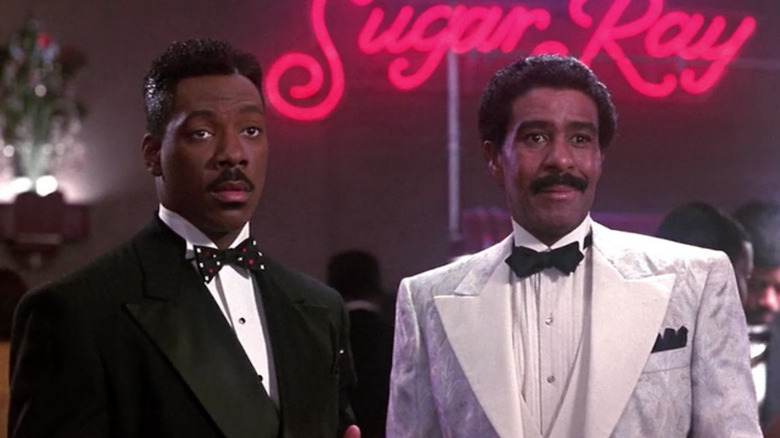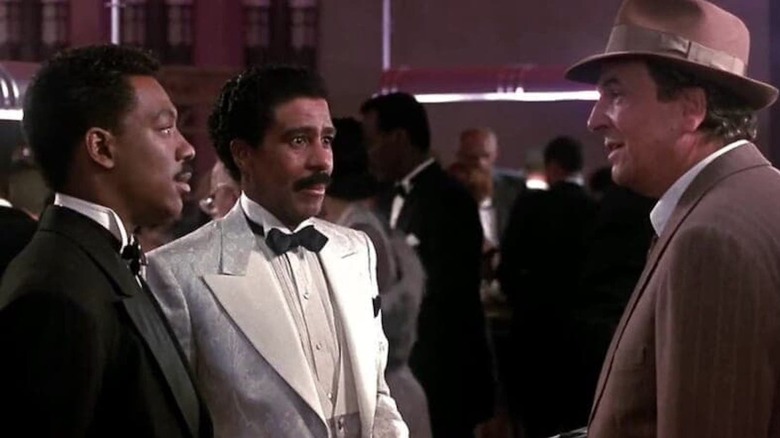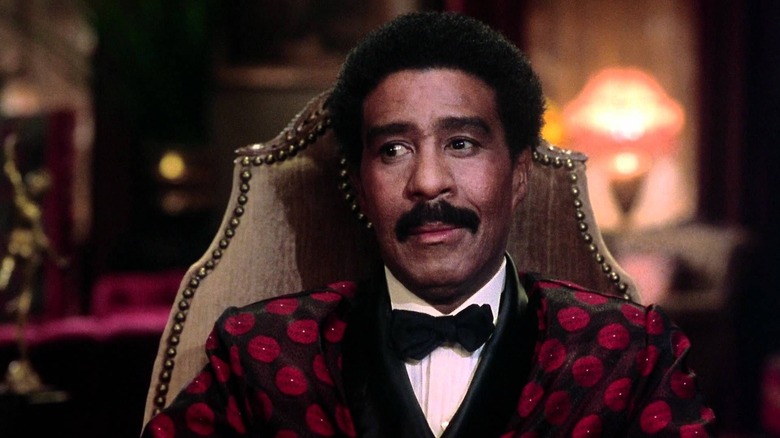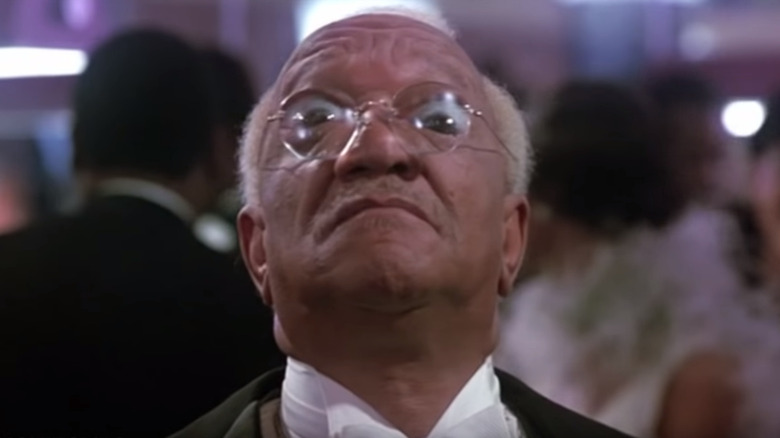Richard Pryor And A Slapdash Script Made Harlem Nights Miserable For Eddie Murphy
The cliche holds that when a movie star attains a certain degree of success, they get bored or convinced of their own brilliance and say, "What I'd really like to do is direct."
Name a big-screen megastar from the last 75 years of filmmaking, and it's likely they followed through on this impulse. Marlon Brando, Paul Newman, Robert Redford, Burt Reynolds, Jack Nicholson, Kevin Costner, Denzel Washington... these men (and notice it's all men, though that's ever so slowly changing) didn't become icons the world over because they lacked ambition. Once they racked up a few box office hits and maybe an Academy Award nomination or two, they surveyed the Hollywood landscape and saw many more worlds to conquer. Sometimes it goes poorly (Nicholson's "The Two Jakes"), sometimes it's a draw (Newman's "Rachel, Rachel"), and sometimes it's an Oscar jackpot (Redford's "Ordinary People" and Costner's "Dances with Wolves").
For Eddie Murphy, if we're going strictly by the finished product, his one and only directorial effort was the cinematic equivalent of a ground-rule double. 1989's "Harlem Nights" is nothing if not ambitious. Murphy assembled a murderer's row of comedic talent, and tried to make an African-American variation on "The Sting" set in the twilight of the Harlem Renaissance. He's the sole credited screenwriter, and crafted a leisurely paced caper that makes up for its ungainly setup with a richly satisfying payoff.
"Harlem Nights" biggest weakness is also its occasional strength: who needs a plot when you can hang out with the trash-talking likes of Redd Foxx, Robin Harris, Arsenio Hall and Della Reese for a couple of hours? Foxx in particular is a scream as a legally blind croupier. As a first-time writer-director with impeccable comedic instincts, Murphy understandably eases off the narrative gas when he knows his explosively funny ensemble is clicking, but in downshifting to hang out with the gang, he periodically kills the film's momentum. He's also got another, much bigger problem: his co-star and stand-up hero, Pryor, has almost zero interest in riffing with his peers.
Did Richard Pryor actually hate Eddie Murphy?
Throughout the 1970s and well into the 1980s, Richard Pryor was widely considered to be the funniest man on the planet. His stand-up act was revelatory. He didn't tell jokes so much as disappear into characters. Within the span of 20 minutes, he could transform himself from a sex-deprived teenager to a Black preacher performing an exorcist ("It smells like s*** in here, and some devilish s*** at that!") to a wino directing traffic outside of a church on Sunday. He was a once-in-a-lifetime genius.
Murphy idolized Pryor. However, in a 1990 Spin interview with Spike Lee, the star revealed that Pryor did not reciprocate the young superstar's affections on the set of "Harlem Nights." "[I]t was disappointing because Richard wasn't the way I thought Richard was gonna be," said Murphy. "I thought it would be like a collaborative thing where I would get to work with my idol, and then it would be like, 'This is great.' But Richard would come to the set, say his line and leave, it wasn't like a collaborative thing."
Lee, who obviously holds Pryor in the same esteem as Murphy, seemed genuinely surprised to hear this. When he asked Murphy to elaborate, the comedian unloaded:
"[T]he only reason he did the movie was he got a big payday out of it, and trust me, the brother does not like me. And I used to have more Richard Pryor pictures up than Elvis Presley. And after I worked with the brother and I found out s***, and you meet people that are around him, know him, and the two camps meet, and people start talking, it's like, Oh s***. And it's real weird to find out your idol hates you and s***."
Richard Pryor couldn't be Richard Pryor
Pryor had reasons to resent Murphy professionally. Though 1979's blazingly brilliant "Richard Pryor: Live in Concert" had broken cinematic ground as the first stand-up film to receive wide theatrical distribution (and is still the gold standard for the format), his incendiary talent was never properly showcased in a comedic feature. He had his moments in "The Mack" and "Car Wash," and paired well with Gene Wilder in "Silver Streak" and "Stir Crazy," but his chameleon-like abilities, similar to those Murphy displayed in "Coming to America" and "The Nutty Professor," were ill-served by the leaden "Which Way Is Up?"
Sadly, there was more going on than professional jealousy. While making "Harlem Nights," Pryor had yet to go public with his multiple sclerosis diagnosis, which, along with his other health issues (he survived one heart attack in 1977, and would undergo a triple bypass in 1990) effectively ended his acting career. Even if he wanted to be peak Pryor on the set of "Harlem Nights", he couldn't summon the old magic. This had to be unbearably frustrating for the man.
Harlem Nights deserves better
In 2016, nine years after Pryor's death, an older, wiser Murphy threw the blame for Pryor's "Harlem Nights" discomfort on himself. As he told Vulture's Stacey Wilson Hunt, "He was sick with MS by then, but nobody knew it was going on. And I was like a puppy to him 'cause he was my idol. 'Hey! Let's go make this movie!' I never put it together what was happening till afterwards. So it was kind of sad, that part of it."
Due to negative reviews, "Harlem Nights" is viewed today as Murphy's first big-screen folly, when it should actually be celebrated as a significant work in the history of African-American cinema. Murphy went out of his way to hire a predominantly Black crew, which Pryor, in an interview with Rolling Stone, noted was highly unusual at the time. "Have you ever in your life seen this many Black people on a movie set?," he asked. "I haven't."
As for the film itself, when it's on, it's an absolute riot. Murphy getting into a fistfight with Della, Foxx warning Murphy not to mess around with a Creole woman because she'll put a "root" on him, Hall's cameo as a hysterical hitman: these moments more than offset the movie's lulls. We all know the film failed to live up to its towering expectations. 33 years later, it's time to cut Murphy some slack and enjoy "Harlem Nights" as a hangout caper comedy that delivers when it counts.



